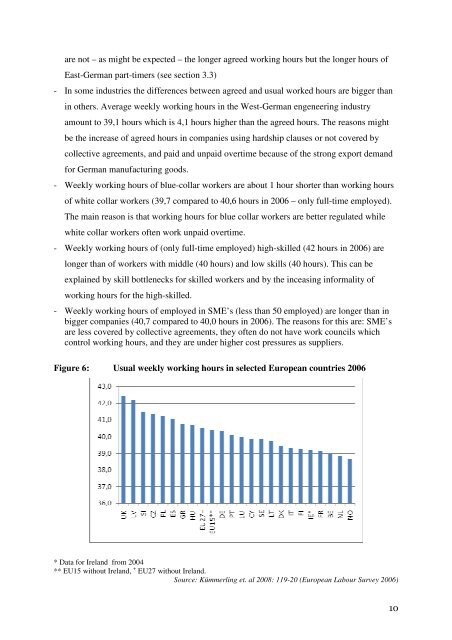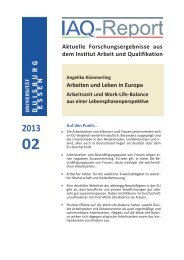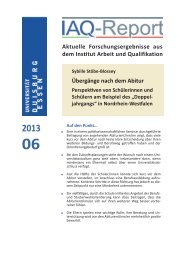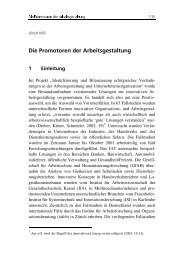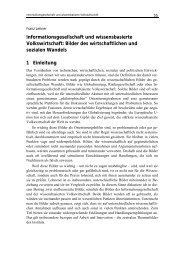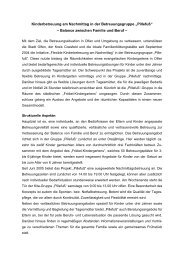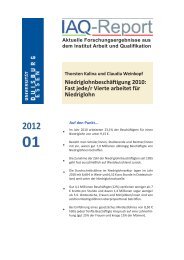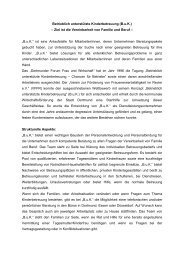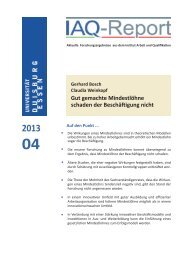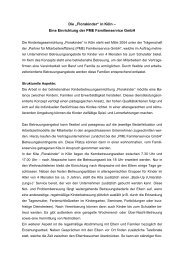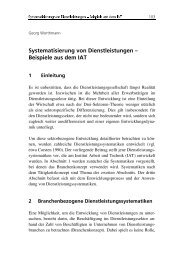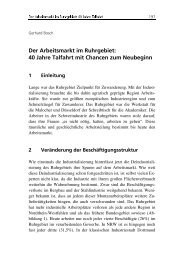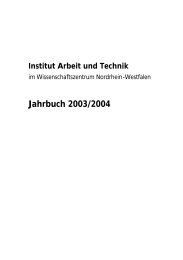Gerhard Bosch Working time and working time policy in Germany 1 ...
Gerhard Bosch Working time and working time policy in Germany 1 ...
Gerhard Bosch Working time and working time policy in Germany 1 ...
Create successful ePaper yourself
Turn your PDF publications into a flip-book with our unique Google optimized e-Paper software.
are not – as might be expected – the longer agreed <strong>work<strong>in</strong>g</strong> hours but the longer hours of<br />
East-German part-<strong>time</strong>rs (see section 3.3)<br />
- In some <strong>in</strong>dustries the differences between agreed <strong>and</strong> usual worked hours are bigger than<br />
<strong>in</strong> others. Average weekly <strong>work<strong>in</strong>g</strong> hours <strong>in</strong> the West-German engeneer<strong>in</strong>g <strong>in</strong>dustry<br />
amount to 39,1 hours which is 4,1 hours higher than the agreed hours. The reasons might<br />
be the <strong>in</strong>crease of agreed hours <strong>in</strong> companies us<strong>in</strong>g hardship clauses or not covered by<br />
collective agreements, <strong>and</strong> paid <strong>and</strong> unpaid over<strong>time</strong> because of the strong export dem<strong>and</strong><br />
for German manufactur<strong>in</strong>g goods.<br />
- Weekly <strong>work<strong>in</strong>g</strong> hours of blue-collar workers are about 1 hour shorter than <strong>work<strong>in</strong>g</strong> hours<br />
of white collar workers (39,7 compared to 40,6 hours <strong>in</strong> 2006 – only full-<strong>time</strong> employed).<br />
The ma<strong>in</strong> reason is that <strong>work<strong>in</strong>g</strong> hours for blue collar workers are better regulated while<br />
white collar workers often work unpaid over<strong>time</strong>.<br />
- Weekly <strong>work<strong>in</strong>g</strong> hours of (only full-<strong>time</strong> employed) high-skilled (42 hours <strong>in</strong> 2006) are<br />
longer than of workers with middle (40 hours) <strong>and</strong> low skills (40 hours). This can be<br />
expla<strong>in</strong>ed by skill bottlenecks for skilled workers <strong>and</strong> by the <strong>in</strong>ceas<strong>in</strong>g <strong>in</strong>formality of<br />
<strong>work<strong>in</strong>g</strong> hours for the high-skilled.<br />
- Weekly <strong>work<strong>in</strong>g</strong> hours of employed <strong>in</strong> SME’s (less than 50 employed) are longer than <strong>in</strong><br />
bigger companies (40,7 compared to 40,0 hours <strong>in</strong> 2006). The reasons for this are: SME’s<br />
are less covered by collective agreements, they often do not have work councils which<br />
control <strong>work<strong>in</strong>g</strong> hours, <strong>and</strong> they are under higher cost pressures as suppliers.<br />
Figure 6: Usual weekly <strong>work<strong>in</strong>g</strong> hours <strong>in</strong> selected European countries 2006<br />
* Data for Irel<strong>and</strong> from 2004<br />
** EU15 without Irel<strong>and</strong>, + EU27 without Irel<strong>and</strong>.<br />
Source: Kümmerl<strong>in</strong>g et. al 2008: 119-20 (European Labour Survey 2006)<br />
10


